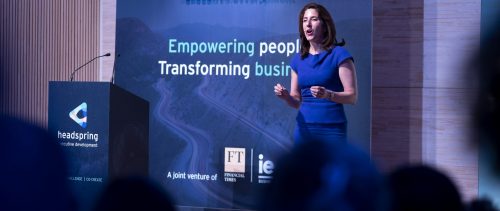- Online Programme
RESPONSIBLE CAPITALISM PROGRAMME: THE NEW AGENDA
A virtual leadership development programme about sustainable business with exclusive insight and expertise from leading Financial Times journalists.

For Leaders and Changemakers
The world of business is facing its biggest shift since the industrial revolution.
To navigate this world, leaders are required to give businesses a new purpose: one that is beyond profit and beneficial for all stakeholders.
This programme was designed to help leaders thrive in this new reality. By combining strategic thinking with a global context from Financial Times journalists, participants will leave with a clear strategic vision to help your business navigate and thrive in a changing world.

Flexible
The programme has a flexible design, which will ensure it is the right learning solution for your business.

Live Online
Participants are in control of their learning experience and can access live session or on-demand.

Collaborative
Through group work, participants apply their skills to solve specific challenges faced by your business.
Understand where change impacts your business
Every business is different. Every business feels the impact of change differently. Shifts on the perception of the social and ethical role of businesses are driving new consumer behaviour as well as employee relations trends.
This programme has been designed to help leaders understand and face these trends so they can seize opportunities and achieve growth.

New trends in consumer behaviour

Activist investors and new regulation

Employee relations, recruitment and retention

Social media culture and reputation

1. ESG and reputation management
The game has changed for communications teams.
Businesses are facing scrutiny in a whole new range of areas, including diversity, supply chain and ethical data management. With the rise of the name-and-shame culture of social media, leaders also need to be alert to user-generated content that can have a serious impact on a company’s reputation.
This session will consider recent cases of businesses that have had their reputations damaged by ESG-related issues. The session will be designed to generate an open debate and exchange of ideas, and also deliver actions that can help leaders understand the context around these issues.

2. ESG and the 21st Century Workforce
Creating a diverse, agile and ethical organisation.
Employee relations, retention and recruitment have evolved. If in the past they used to be considered simply a human resources concern, they are now strategic issues. The race to find, integrate and keep the best and the most diverse talent is part of the growth strategy of any organisation.
The impact of ESG on the Millennial and Gen-Z workforce is clear: they do not simply care about salary and benefits – alignment to values is now a decision-making factor for high-potential candidates. But while businesses are forced to adapt to attract a new generation, they also need to consider the existing workforce and how to maintain stability. Striking a balance is key.

3. Ethical Dilemmas in Digital Transformation
Can we be trusted to use data ethically?
Data analytics have enabled businesses to identify hidden patterns in consumer behaviour and benefit from a deeper understanding of their market. However, access to data-rich ecosystems, combined with the pressure to deliver business results, often leads business executives and decision-makers into ethical dilemmas.
According to the European Data Protection Board, since the launch of the GDPR over 89,000 data breach notifications have been reported to national data protection authorities. Making ethical decisions is not always black and white. The aim of this session is to address key ethical dilemmas and reveal what business leaders can do to avoid the most common pitfalls.

4. Moral Money: Profit & Purpose
Shaping a purpose-driven financial strategy.
Organisations globally have signed up to ESG commitments, but are they acting?
As commercial departments have targets to meet, it is often difficult for decision-makers to honour ESG commitments when pursuing business opportunities. So how can the people that are responsible for driving growth and managing balance sheets take courage to make tough decisions?
The goal of this session is to help decision-makers identify the big questions they should be asking and align their financial and growth strategies to a purpose-driven approach.
Make it Unique to your Business
Delivering deep and current insights into real business-relevant topics, we will help your team stay abreast of technological, political or economic trends as they happen.

Fully Online. Live or On-Demand
A high-impact leadership programme created to meet the demands of the world we live in. Fully online.

World-Class FT Journalists
Learn from some of the world's most influential and well-connected Financial Times journalists.

52,070 digital learners and counting
We design and deliver transformative learning solutions to some of the world's largest businesses.
- Journalistic Approach
What does the FT bring?
FT Journalists play a key role in our programmes. They offer global and local context and a deep insight into some of the world's fastest-growing trends and industries.Watch the video
Trusted by global leaders
Meaningful business transformation starts from within. These are some of the clients whose businesses we’re helping to reinvent, with programmes designed to bring out the best in their people.
How we will work with you
Co-creation is one of the key principles of the Headspring approach. We don’t assume we have the answers – instead, we work with our clients to create and deliver a solution that meets its main goals and objectives. As part of this process, the next steps will include:

Connect

Co-design

Bring to life
















